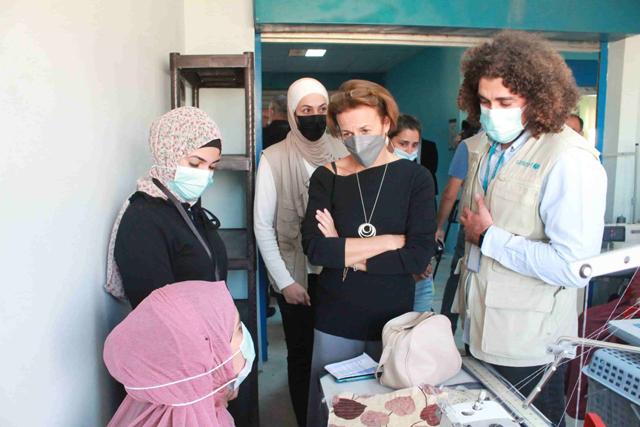You are here
UNICEF, Dar Abu Abdullah join hands in creating jobs amid pandemic
By Batool Ghaith - Apr 08,2021 - Last updated at Apr 08,2021
UNICEF and Dar Abu Abdullah have partnered to provide women and youth in Jordan with access to employment through the production of hundreds of thousands of non-medical face masks to support the national COVID prevention response, in addition to providing training in financial literacy and leadership (Photo courtesy of UNICEF)
AMMAN — UNICEF and Dar Abu Abdullah have partnered to provide women and youth in Jordan with access to employment through the production of hundreds of thousands of non-medical face masks to support the national COVID prevention response, in addition to providing training in financial literacy and leadership.
Dar Abu Abdullah (DAA) is a non-profit, non-governmental organisation with a mission to empower the most vulnerable individuals and sustain their livelihoods through projects that address the underlying causes of hunger and poverty across Jordan.
According to Tanya Chapuisat, UNICEF Representative in Jordan, the partnership is under UNICEF’s “Amaluna” programme, which seeks to support the most vulnerable young people with demand-driven economic engagement opportunities empowering them in their transition to productive and resilient adulthood, all the while contributing to an inclusive national economy.
The programme lasted from June 25 until December 25, 2020. Building on the success of the first intervention, UNICEF plans to scale up the programme in 2021 to provide more opportunities for youth and women, promote responsible procurement and create strong alliances with the private sector, Chapuisat said.
“The project focused on assisting the livelihood of vulnerable women by engaging them in an income-generating opportunity that will support them and their families to absorb the economic shock of the COVID crisis,” Chapuisat told The Jordan Times.
Of the women who joined the programme, 76 per cent have reported their main sources of income being extremely affected by the pandemic; they had either lost their jobs, received reduced salaries, or faced increased scarcity in available gig work opportunities. In contrast, 94 per cent of the women who participated in the programme reported that they were able, with the income generated through this project, to cover their basic needs of those of their families without help from others, Chapuisat noted.
“Participants received training from UNICEF on financial literacy and leadership to boost the long-term benefits of this programme,” Chapuisat added.
The project, which aimed to produce 780,000 non-medical face masks, has trained and mobilised 355 vulnerable women from the governorates of Amman, Balqa, Jerash, Madaba, Mafraq and Zarqa.
“Jordan has one of the world’s youngest populations, presenting a major demographic dividend that can play an integral role in building a sustainable, inclusive and resilient economy in the post-COVID-19 recovery,” Chapuisat said.
She indicated that UNICEF’s “Amaluna” programme has supported 2,500 youth across Jordan with market-driven training and essential work skills in addition to providing access to meaningful employment.
“The programme has achieved a 70 per cent employment rate and supported the establishment of 95 women- and youth-led social enterprises,” she explained.
One participant from Mafraq expressed how much the income she generated from this project changed the life of her family as it enabled her to live in a house and to provide the family’s basic needs.
“I used to live in a tent. Through the income I generated from this project, I rented a house. Now my house is in the city and my children go to a better school. We are so happy now,” she said.
Among the participants were two sisters, divorced and with children. They lived in very hard conditions prior to the project but after participation in the programme their conditions improved greatly, according to UNICEF.
“Through this project, we managed to rent a house, work from their home, and provide for our children,” a UNICEF statement quoted them as saying.
Almost all participants agreed that the project provided them with benefits beyond the income they generated, including hope, self-confidence, communication skills as well as the strengthening of their family bonds, according to Chapuisat.
Related Articles
AMMAN — UNICEF and Dar Abu Abdullah (DAA) on Monday launched the Women’s Capacity Building and Productive Centre in Mafraq, as part of their
AMMAN — UNICEF has procured 45,000 locally manufactured warm winter clothing kits for vulnerable children, UNICEF Jordan Representative Tany
AMMAN — A new training and manufacturing centre designed to promote the economic resilience of disadvantaged young women living in Jerash Ca


















